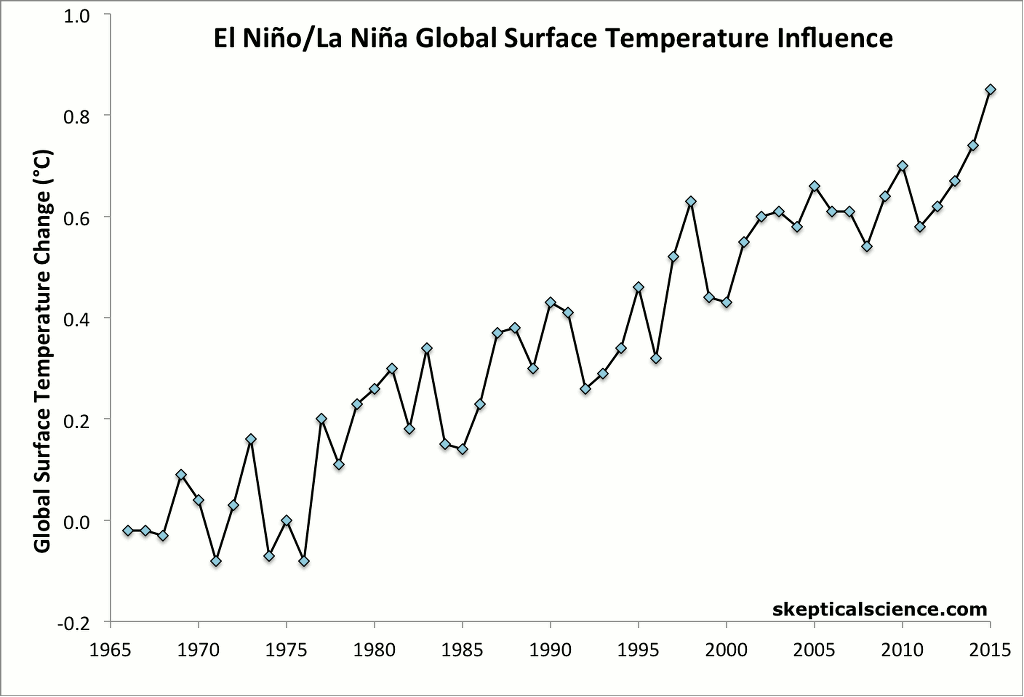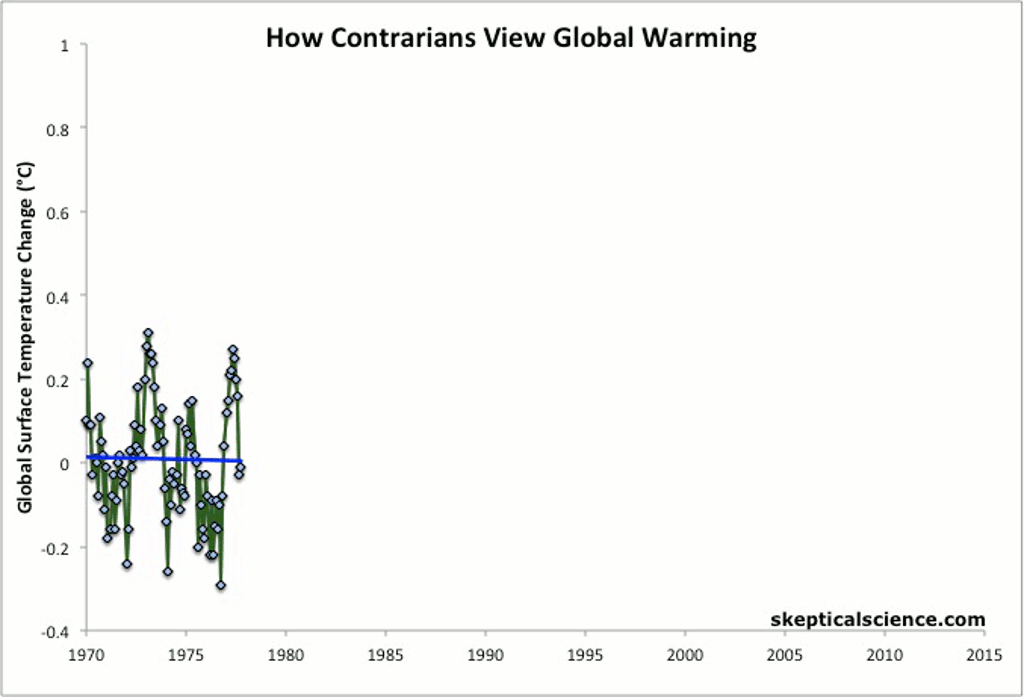But what’s really remarkable is that 2014 set this record without the aid of an El Niño event. El Niño events create conditions in which sea surface and hence global surface temperatures are anomalously hot. We call this part of the Earth’s “internal variability” because these events just temporarily shift heat around between the ocean surface and its depths.
As this graphic shows (click here for an animated version), the last five record hot years of 2010, 2005, 1998, 1997, and 1995 were all assisted by El Niño events.

In contrast, 2014 had a slight cooling influence from La Niña-like conditions at the beginning of the year, a slight warming influence from El Niño-like conditions toward the end, and no net temperature influence from the El Niño Southern Oscillation (ENSO) for the year as a whole. 2014 was by far the hottest ENSO-neutral year on record, and the first year since 1990 to set a record without influence from El Niño.
1998, which saw the strongest El Niño on record, now falls to 5th-hottest year on record. The intense El Niño event made global surface temperatures in 1998 about 0.2°C hotter than they would have otherwise been. Due to human-caused global warming, ENSO-neutral years are now hotter than even the most intense El Niño years a decade or two ago. As NASA GISS director Gavin Schmidt said,
This is the latest in a series of warm years, in a series of warm decades. While the ranking of individual years can be affected by chaotic weather patterns, the long-term trends are attributable to drivers of climate change that right now are dominated by human emissions of greenhouse gases
As the above graphic shows, over the past 50 years, there has been the same 0.15–0.16°C per decade warming trend for La Niña years, for ENSO neutral years, and for El Niño years. So for example, an ENSO-neutral year today is about 0.25°C hotter than a similar year would have been in 1998. That’s why 2014 was hotter than 1998 despite the big difference in El Niño temperature influences between the two years.
This is all happening during a time when we’re constantly being bombarded with inaccurate claims of a global warming “pause.” These mistaken claims stem from the fact that the rate of global surface warming has slowed a bit over the past 15 years, in large part because we’ve seen more La Niña events and fewer El Niño events during that time, and also due to heightened volcanic activity.
In fact, at any point over the past five decades we can find a period during which global surface warming “paused.” Yet each such period was hotter than the last. That’s because each is just a temporary effect caused by a period with a predominance of La Niña events and other short-term cooling temperature influences. As this figure shows (click here for an animated version), underneath the short-term noise, human-caused global warming continues unabated.

Following the global surface temperature records set in 2005 and 2010, a new record in 2014 is right on schedule. A 2011 paper by Stefan Rahmstorf and Dim Coumou found that as global warming continues, we should expect to set new records about once every four years.
Indeed, if we only use the data of the past 30 y, these show an almost linear trend of 0.017°C/y, yielding an expected 2.5 new record hot temperatures in the last decade [1 per 4 years].
Given that we may see an El Niño event in early 2015, there’s also a chance that this record could be short lived, and 2015 might break it once again.
On top of the record global surface temperatures, we also saw a record amount of heat accumulating on Earth, mainly in the oceans. According to NOAA, in 2014 the oceans accumulated an amount of heat equivalent to about 200 million atomic bomb detonations (13 zettajoules, or 13 billion trillion Joules). That’s about 6 to 7 atomic bomb detonations per second, on average, throughout 2014. That’s a lot of heat, likewise reaching record levels.
Climate Nexus summarizes some other notable climate facts from 2014 in this video,































 Arguments
Arguments






























Thanks Rob Honeycutt for actually addressing what te UK Met Office is saying. Yes I agree they are being cautious but, as I'm sure you know, when submitting a paper for publication, to ehance your chances with the reviewers it is usually better to err on the side of caution. From the new post on SkS the bet wasn't scrubbed as the stats weren't conclusive shows that the two bettors didn't really care and fair enough too in the context of the bet. That said however I do think that accepting the constraints on conclusions placed by adhering to the results of statistical analysis is preferable to disregarding the stats
Think it through, though. The way this is all suddenly being re-defined means that there will never be any new record warm years. There will likely always be some statistical likelihood (however small) that another year was actually warmer.
So, now climate deniers can go all the way through the rest of the century stating that no year has been the warmest year, even as surface temps rise to 4C+.
I really don't think that will happen as I'm sure at some stage the global temperature of a particular year will be statistically different from the temperature in other years. In any event how important is it for a particular year to be called the "hottest ever"? Apologies but I don't know what you mean by surface temps rise to 4C+.
The way climate deniers are currently objecting to this latest record hot year, yes, that's what they're going to do. You'd have to have an extreme record to have the uncertainty fall above the uncertainty range of all previous years.
And, 4C+ is a reference to business-as-usual emissions path leading to a 4C or better rise in surface temperatures over pre-industrial levels by 2100.
ryland @various, my argument is not with the Met Office. It is with the pseudo-skeptics who created a furror when (according to them) GISS announced that 2014 was a record year without qualification. The simple fact is that 2014 is the record year in the GISSTEMP temperature index. As it happens, the GISS announcement actually discussed the uncertainty in greater detail than has the HadCRUT4 announcement. They just did not use the form of words that the pseudoskeptics wanted. What is worse about some pseudoskeptics is that when knowledge of the table shown @36 became available, they treated it as a subsequent announcement, as a backdown, and as proof that 2014 was not the record year. Each of those claims was false, and the first two grossly misrepresent the communications from NASA GISS.
Beyond the political agenda of those pseudoskeptics, what is going on here is that people are confused by what is meant by "record x". The record x, for whatever x is, is simply the highest value in the record. The Guiness Book of Records, for example, does not claim that the car that currently holds the land speed record was the fastest ever car. It simply claims that it is has the fastest speed entered in the records. Other cars may have been faster, but been excluded because of the presence of a strong tail wind, the failure to run the test in both directions within a given time limit, or the simple absence of an official observer. They do not even take note of potential error margins in observations which are certainly there, although I do not claim they are significant. Likewise when reporting on the fastest delivery in cricket, nobody worries about the uncertainties in measurement. Indeed, when record cold winters for the US are announced, the pseudoskeptics definitely do not draw attention to uncertainties (which are even more of a factor). They just accept face value, or distort the figures.
So, 2014 is the warmest year in the GISS record, and the warmest year in the HadCRUT4 record, and the warmest year in the NOAA record, and the warmest year in the BEST record. That does not mean it was in fact warmer than 2010, because the measurement of GMST is uncertain - but it is the record year for each of those temperature indices.
Further, distracting from that fact by saying it may not have been the record year is pure obfustication. With HadCRUT4 (having now actually run the numbers), if you allow that obfustication there have been just 3 record years (1850 (by definition), 1990, and 1998), rather than the 15 record years that have actually occurred - 9 of them since 1983 (inclusive); and 4 of them since 1998 (inclusive). (Full list at end of post.) Further, the obfustication means that, if we accept the distorted terminology, the most recent "record year" is 1998, even though 1998 has a very low probability of being the actual hottest year in the last 150 years according to HadCRUT4, (and is "statistically excluded" according to BEST).
1850
1851
1868
1877
1878
1944
1983
1988
1990
1995
1997
1998
2005
2010
2014
Sorry, forgot to add a footnote. HadCRUT4 has been updated to a new version, but because the data with uncertainties was not currently accessible, I used the data for version 4.3.0.0 in my analysis.